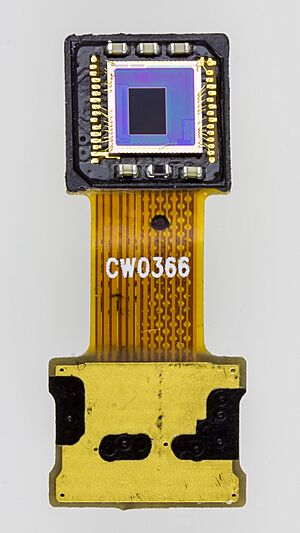Front-facing camera facts for kids
A front-facing camera, often called a selfie camera, is a special camera. You can find it on many devices like mobile phones, smartphones, tablets, and laptops. Unlike regular cameras that point away from you, a front-facing camera points towards you. This lets you see yourself on the screen while taking a picture or video. It's super useful for videotelephony (video calls) and, of course, for taking selfies! When you see yourself on the screen, it often looks like a mirror image. This makes it easier to pose. Don't worry, the final picture won't be flipped!
Contents
The Story of Selfie Cameras
Front-facing cameras weren't always common. Let's look at how they became a big part of our daily lives.
Early Rotating Cameras
One of the first cameras that let you see yourself was the Casio QV-10. It came out in 1995. This digital camera had a lens that could spin around 180 degrees. This meant you could turn the lens to face you while looking at the camera's color screen. It was a new idea for taking pictures of yourself!
Cameras on Handheld Devices
The very first front-facing camera on a handheld device was the Game Boy Camera. It was released in Japan in 1998. This camera was an add-on for the popular Game Boy game console. It let you take pictures and play around with them.
The First Selfie Phones
The first phone with a front-facing camera was the Kyocera Visual Phone VP-210. It came out in Japan in 1999. People called it a "mobile videophone" back then. It had a camera with 110,000 pixels. You could save up to 20 pictures on it. You could also send these pictures by e-mail. Or, you could send two pictures per second over Japan's wireless phone network.
Selfie Cameras Go Global
By 2003, more phones with front-facing cameras started appearing in Western countries. Some of these phones included the NEC e616, Sony Ericsson Z1010, and Motorola A835. At first, these cameras were mainly for video calls. The Motorola A920, also released in 2003, might have been the first smartphone to have a front-facing camera.
Modern Selfie Cameras
The iPhone 4 was the first iPhone model to include a front-facing camera. This helped make them even more popular.
In 2017, the Essential Phone introduced something new called the "notch." This is a small cutout at the top of the screen. It makes space for the front-facing camera. The iPhone X later made this design very popular.
Today, some smartphones have cameras that pop up from inside the phone. This lets the screen take up almost the entire front of the device. Scientists are even working on "under-display cameras." These cameras would be hidden right under the screen. This means you wouldn't see the camera at all until you use it!


